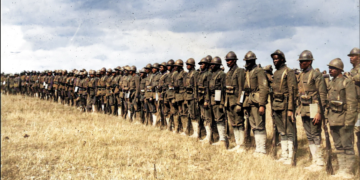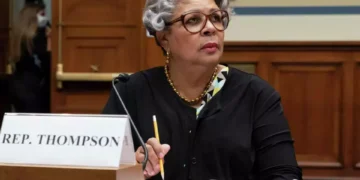May 30, 2025 Story by: Publisher
More than 150 years after their deaths, New Orleans on May 30–31, 2025 held a solemn memorial and jazz funeral to lay to rest the skulls of 19 Black residents of Charity Hospital.
The remains had been taken to Germany in the late 19th century for “research,” and were only recently repatriated by Leipzig University.
The two‑day event at Dillard University confronted a dark chapter of scientific racism, celebrated the victims as individuals, and signaled a community commitment to justice and remembrance.
Laid to rest will be the remains of Adam Grant, Alice Brown, Henry Allen, Henry Anderson, Henry Williams, Hiram Malone, Hiram Smith, Isaak Bell, John Brown, John Tolman, Mahala, Marie Louise, Moses Willis, Prescilla Hatchet, Samuel Prince, William Pierson, William Roberts and two unidentified people.
Historical Context
In December 1871 and January 1872, Charity Hospital in New Orleans – then the city’s public hospital – treated and subsequently lost 19 Black patients.
According to Dillard University’s research, all 19 died at Charity Hospital during that period. White doctors working at Charity quietly severed their heads and prepared the skulls for shipment overseas.
In the 1880s, New Orleans physician Dr. Henry D. Schmidt sent those 19 crania to Dr. Emil Ludwig Schmidt in Leipzig, Germany. There, anatomists catalogued the skulls as “specimens” for study under the pseudoscience of the day, in an attempt to prove the unfounded theory that Black people’s brains were smaller and thus intellectually inferior.
As Dillard’s press materials note, this was an era of “racially biased scientific research,” and the skulls were acquired “during a time of rampant colonialism and racial pseudoscience”.
- Dec 1871–Jan 1872: Nineteen Black New Orleanians die at Charity Hospital. Hospital staff remove and preserve their skulls.
- 1880s: Local physician Henry D. Schmidt ships the 19 skulls to Leipzig University in Germany. Phrenologists there include the skulls in a collection, treating them as research subjects to justify racist theories.
- 2023: The University of Leipzig reaches out to New Orleans, offering to return the remains. New Orleans officials and scholars form a Cultural Repatriation Committee – led by Dillard University history professor Dr. Eva Baham – to arrange the repatriation.
- May 30–31, 2025: After a two-year effort, the skulls are flown back to New Orleans. A public visitation and memorial service (culminating in a jazz funeral) are held on May 31 to honor and inter the 19 ancestors.
Throughout this ordeal, the 19 were often referred to only as anonymous research subjects. As Dillard University president Monique Guillory emphasized, the victims “were people with names” – not mere specimens or numbers. Today the university and city are finally restoring their names and dignity.

Photo caption:The remains of 19 African Americans were wrongfully taken from New Orleans in 1872 and sent to Leipzig, Germany, for racially biased scientific research. (Photo courtesy of: Jacob Cochran / Dillard University)
Repatriation and Memorial Service
The University of Leipzig initiated the return by contacting New Orleans officials in 2023 about the existence of the remains. That outreach triggered a formal partnership: Dillard University, Xavier University, the City of New Orleans, University Medical Center (UMC, the successor to Charity Hospital), and other partners formed the Cultural Repatriation Committee.
Over the next two years, the committee coordinated travel, research and outreach (including searching for descendants) as the skulls were prepared for transport. When the remains arrived in New Orleans in late May, they were received at Rhodes Funeral Home in a private ceremony, before plans for a public commemoration were finalized.
On May 31, the community gathered at Dillard’s Lawless Memorial Chapel. A visiting service began at 9 a.m., followed by a memorial ceremony at 11 a.m. (per the announced schedule).
The event was free and open to the public.
Those to be honored – whose names were identified by Dillard researchers – included men and women of various ages and backgrounds (for example, a 15‑year‑old girl and a 70‑year‑old woman are among the named deceased).
The ceremony explicitly named each individual. As Baham noted, municipal death records showed that some had lived in New Orleans only briefly before dying, and none had known descendants. In place of family members, Baham said “we are serving as the families of these people,” and she invited all New Orleanians to “be a part of bringing dignity to people from whom it was taken”.
Throughout the service, participants framed the occasion as a sacred act of justice and remembrance. Guillory told reporters the memorial would confront “a dark chapter in medical and scientific history” while choosing “a path of justice, honor and remembrance”.
In her prepared remarks, she described the return as far more than a ritual: “This is more than an act of remembrance – it is a restoration of humanity,” Guillory said. Dillard’s statement added that the repatriation is “not only an act of justice – it is an act of healing, rooted in a shared commitment to truth and historical accountability,” echoing organizers’ emphasis on collective reckoning.
In keeping with New Orleans tradition, the ceremony included a jazz funeral procession. A brass band was on hand to accompany the caskets after the chapel service, symbolically affirming the community’s respect.

Photo captions: Leipzig University is repatriating a collection of human remains it acquired more than a century ago. (Photo courtesy: Jacob Cochran / Dillard University)
“We will do so in the most sacred way we know how, in our beloved city, in a true New Orleans fashion, with a jazz funeral that shows the world that these people mattered,” Guillory said. She added that such music and ritual in New Orleans express the belief that the spirits of ancestors remain near, making this homecoming “particularly poignant for people in New Orleans.”
By late afternoon, the remains had been reverently placed in crypts at the Hurricane Katrina Memorial on Canal Street, where they will rest in perpetuity.
University Medical Center Vice President Charlotte Parent reflected on the significance of this choice: UMC (“deeply rooted in Charity Hospital’s legacy,” she noted) was “honored to join Dillard University and the City of New Orleans in recognizing and respecting the individuals and families impacted by racial inequities,” part of a shared commitment to a more just future.

Photo captions: A memorial and a proper jazz funeral are scheduled Saturday to lay the remains of the 19 people to rest. (Photo courtesy of: Jacob Cochran / Dillard University )
Meaning, Justice and Ancestral Dignity
Community leaders and organizers stressed that the repatriation carries weight far beyond the immediate ceremony. It has been described as a symbolic step toward justice and reconciliation. “This is not simply about bones and artifacts,” Guillory told Axios. “It is not only about injustices.
This is about restoring and, in many ways for us here, celebrating our humanity”. By honoring these ancestors by name and with ceremony, the city is refusing to allow their memory to fade. “They were stripped of their dignity,” Guillory said, and the city’s response aims to restore that dignity. As she reminded attendees at the press conference, “They were people with names. … They were not specimens, not numbers”.
For a community built on rituals of remembrance, the return of these remains also reinforces New Orleans’ identity. Organizers invoked the city’s commitment to uplifting those long marginalized. Baham noted that no known descendants could claim these ancestors; the community “served as the families” of the lost, calling all neighbors to honor them.
The jazz funeral – a uniquely New Orleans tradition – was chosen to show the world “these people mattered. They belonged here, and now they are home”. In short, what was once medical exploitation has been transformed into a collective act of repair.
Experts say the event contributes to broader efforts to address the legacy of scientific racism and medical exploitation of Black Americans. It demonstrates an institutional willingness to confront past abuses.
Dr. Eva Baham put it plainly: by collaborating to bring the skulls home, “we are not talking about them as if they are skeletal remains… We want to honor them by calling them the individuals that they are”. In the end, the Cultural Repatriation Committee framed the return as “an act of justice” and even an “act of healing” for a long‑neglected history.
As the funeral procession played hymns into the New Orleans dusk, elders and youth alike stood in memory of ancestors who had been lost to history. “We want that day to be not only of remembrance, but of reckoning and renewal,” Guillory said, hoping that “we may never forget them”. In recognizing this painful chapter, New Orleans affirmed a commitment to truth, dignity and honoring the humanity of those who had been dehumanized.
This is what is known about the 19 people whose remains have now been returned to New Orleans, according to research shared by Dillard:
- Moses Willis, 23, a Virginia native who died Dec. 5, 1871.
- Isaak (or Isaac) Bell, 70, a native of North Carolina, who died Dec. 5, 1871.
- Henry Anderson, 23, a Missouri native who died Dec. 10, 1871.
- Henry Williams, 55, a North Carolina native who died Dec. 14, 1871.
- Prescilla Hatchet, 19, a Virginia native who died Dec. 16, 1871.
- Alice Brown, 15, a Louisiana native who died Dec. 17, 1871.
- John Tolman, 23, a South Carolina native who died Dec. 17, 1871.
- Samuel Prince, 40, a Louisiana native who died Dec. 20, 1871.
- Hiram Smith, 22, a Virginia native who died Dec. 22, 1871.
- Marie Louise, 55, a Louisiana native who died Dec. 24, 1871.
- Hiram Malone, 21, a Tennessee native who died Dec. 24, 1871.
- Henry Allen, 17, a Kentucky native who died Dec. 26, 1871.
- Mahala, 70, a Virginia native who died Dec. 26, 1871.
- William Pierson, 43, a Louisiana native who died Dec. 27, 1871.
- John Brown, 48, a Louisiana native who died Dec. 27, 1871.
- Adam Grant, 50, a native of Tennessee who died Dec. 31, 1871.
- William Roberts, 23, a Georgia native who died Jan. 10, 1872.
- Two unidentified people.
Sources: Axios / Dillard University / NBC News / Washington Post

















